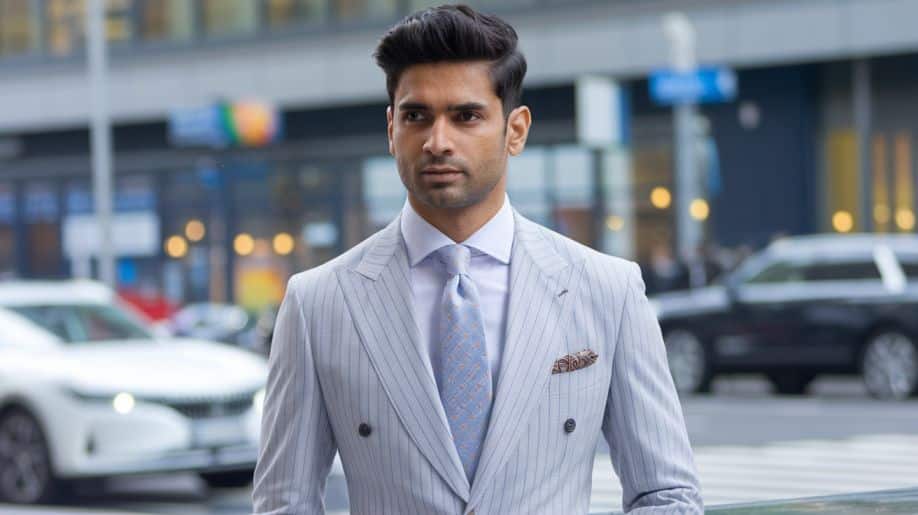Suit Yourself: Trends That Elevate or Erode Style
In recent years, suit trends have evolved to blend classic elegance with modern comfort, allowing today’s gentleman to make a statement while staying true to personal style. From fit and fabric to color and accessories, these changes reflect a shift towards practicality, sustainability, and versatility in men’s fashion. The modern suit is now as much about feeling comfortable as it is about looking sharp. This guide explores what’s in and out for the modern gentleman, helping you navigate the latest trends and invest in stylish and enduring pieces. Discover the essentials of suiting up with purpose and precision.
Current Suit Trends for Modern Gentlemen
- Popular Suit Styles
- Single-Breasted Suits: A versatile choice with a slim silhouette that’s both timeless and modern, suited for formal and semi-formal settings.
- Double-Breasted Suits: Making a strong comeback, these suits add a bold, sophisticated edge, perfect for men looking to make a statement.
- Unstructured and Relaxed-Fit Suits: Focused on comfort, these suits are ideal for casual settings and warmer climates, providing a laid-back yet polished look.
- Trending Fabrics
- Eco-Friendly Wool Blends: Wool remains a classic, but blended with sustainable fabrics, it’s more breathable and suitable for year-round wear.
- Linen and Cotton: Lightweight and ideal for warmer weather, linen and cotton suits bring a relaxed, natural texture and feel.
- Performance Fabrics: Wrinkle-resistant and stretch fabrics are increasingly popular, combining style with functionality for the busy modern man.
- Patterns and Colors
- Muted Earth Tones: Colors like olive, beige, and camel have gained popularity, offering a refreshing alternative to traditional black and navy.
- Minimal Patterns: Subtle checks and pinstripes add texture without overpowering the suit, enhancing versatility for various occasions.
What’s Out: Suit Trends to Avoid
- Overly Tight Fits: While tailored suits should hug the body, excessively tight fits can be uncomfortable and unflattering. Opt for a slim yet breathable fit that allows for movement without sacrificing style.
- Baggy Silhouettes: On the flip side, too-loose suits create a sloppy appearance. Avoid oversized suits that lack structure and don’t complement your body shape; instead, choose styles that provide a clean, tailored look.
- Heavy Synthetic Fabrics: Materials like polyester can trap heat and reduce comfort. Avoid suits made from heavy synthetic fabrics, which don’t allow for breathability and can look less sophisticated than natural fibers.
- Bright Neon Colors: While bold colors can make a statement, overly bright and neon shades often appear garish and out of place in professional settings. Stick to rich, muted tones for a more refined appearance.
- Excessive Patterns: Busy patterns can overwhelm an outfit and detract from its elegance. Avoid overly intricate designs and stick to classic patterns like pinstripes or checks that convey sophistication without distraction.
How to Choose the Right Suit
- Know Your Body Type: Recognize your body shape to choose a suit that enhances your figure. Tailored fits can enhance your best features, whether you’re slim, athletic, or have a broader frame.
- Select the Right Fabric: Choose fabrics based on the season and occasion. Wool is versatile for most seasons, while linen is perfect for warmer climates. Consider breathability and comfort.
- Pay Attention to Fit: A well-fitted suit is essential. Ensure your shoulders are properly aligned, the sleeves reveal a hint of shirt cuff, and the trousers lightly rest just above your shoes. Tailoring can make a significant difference.
- Choose Appropriate Colors: For versatility, opt for classic colors like navy, charcoal, or gray. Lighter shades can be great for summer events, while patterns like pinstripes or checks add personality without being overpowering.
- Consider the Occasion: Select a suit style that matches the event—formal, business casual, or relaxed settings require different approaches. Ensure your suit aligns with the dress code for the occasion.
Accessorizing Your Suit
- Ties: A tie is a timeless accessory that enhances the character of your suit. Select ties in solid colors or understated patterns that enhance the color of your suit. Ensure the width of the tie matches the lapel width for a cohesive look.
- Pocket Squares: A pocket square introduces a touch of elegance and style. Opt for a color that either stands out against or matches your tie. You can choose a classic fold or experiment with different styles to add visual interest.
- Watches: A quality watch enhances your overall appearance. Choose a sleek design that aligns with your style—classic leather straps for formal settings or metal bracelets for a more modern look.
- Belts: Your belt should match your shoes in color and material. A simple, elegant belt can tie the look together and maintain a cohesive aesthetic.
- Shoes: Footwear completes your outfit. Select classic styles such as oxfords, brogues, or loafers. Ensure they are polished and coordinate with the color of your suit and belt.
- Hair and Grooming: Don’t forget personal grooming. A well-styled haircut and neat facial hair contribute significantly to your overall appearance, ensuring you look polished from head to toe.
- Fragrance: A signature fragrance can create a memorable impact. Choose a subtle fragrance that complements your style without being overpowering.
Final Thoughts
Navigating the ever-evolving world of suit trends is essential for the modern gentleman. By embracing contemporary fits, sustainable fabrics, and timeless colors, you can create a wardrobe that balances style and comfort. Avoid outdated styles and excessive embellishments to maintain a polished look. Choosing the right suit reflects your personality and confidence while staying relevant in today’s fashion landscape. Invest in quality pieces that stand the test of time, ensuring you always look your best.


